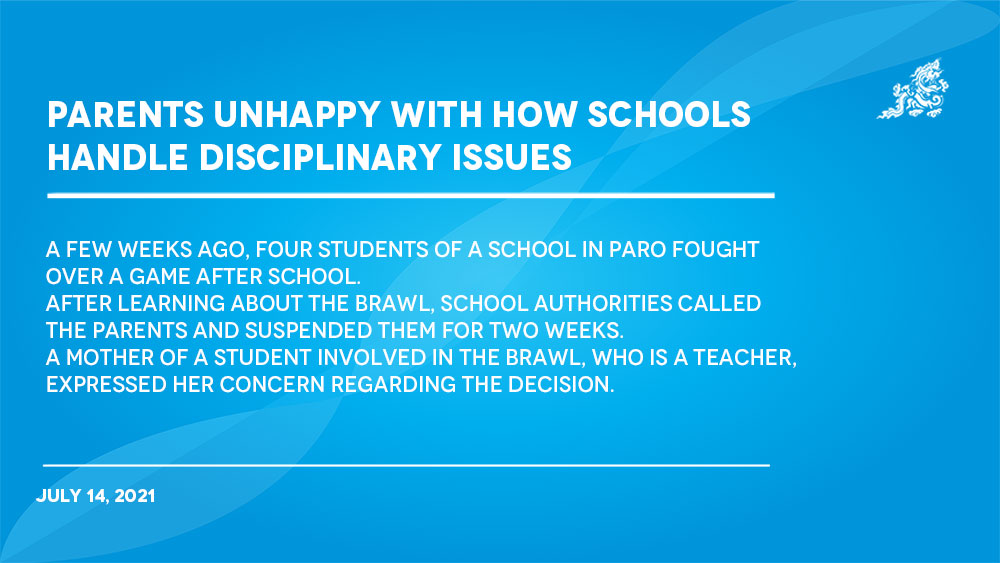Phub Dem | Paro
A few weeks ago, four students of a school in Paro fought over a game after school.
After learning about the brawl, school authorities called the parents and suspended them for two weeks.
A mother of a student involved in the brawl, who is a teacher, expressed her concern regarding the decision.
The mother requested to remain anonymous, claiming teachers and school administration usually targets students when parents confront the school. “Many parents are not willing to speak up because of such practices in schools. That’s why many violence cases are unreported.”
She claimed that the school also threatened to hand over her son to the police if she doesn’t report to the school on time. “Students should be punished in such a way that they realise their mistakes, but schools shouldn’t incriminate them.”
Since her son was a first-time offender, she requested to write a surety stating that she will take him to the police if such incidents happened again. “Without warning and counselling, is it fair to suspend students right before the examination?”
Apart from the four walls of the classroom, she said that the teachers should have a moral conscience and be responsible for impacting children’s lives.
She said that the school should punish her son, but with corrective intervention and positive disciplining as per the guidelines of the 21st century.
She added that law for juveniles should not incriminate them but make them reflect, realise and change. “Police should refrain from juvenile crime. There should be a separate unit for children coming in conflict with the law.”
This isn’t an isolated case.
A civil servant, who works in a remote area, said he had seen school administration directly deciding to either hand over the children to the police or suspend them before understanding its impact on their lives later.
Sonam said that policies and guidelines on child welfare were in place, but the issue arises while implementing them.
He said that some teachers in remote schools come drunk in classes affecting student’s futures, and the school administration doesn’t take any action.
Another parent, Tshering, said that teachers are the main drivers of education, and children spend the crucial years of their lives in school, adding that teachers should look beyond completing the syllabus.
He said that it was essential to consider the background and identify children in difficult circumstances to provide corrective interventions rather than expose their weaknesses. “There is an overwhelming focus on academics and examination in the current education system neglecting other valuable educational goals such as grooming and productive citizens.”
According to a Bhutan Centre for Media and Democracy report ‘Youth Voices: Youth Matters’, an increasing rate of divorce, busy work life, domestic violence, peer pressure and widening communication gap between parent and child is said to be an emerging issue that could be contributing factors to juvenile delinquency and school dropouts among youth.
Teachers, on the other hand, call for better parenting to address such issues.
A school counsellor, Tandin Wangmo, said that schools usually suspend repeat offenders after all the corrective measures and interventions are exhausted.
With increasing youth disciplinary issues in schools, she said that both teachers and parents are responsible for the wellbeing of the children.
A teacher, Pema Choden, said that teachers were equally concerned about the wellbeing of the students as it directly impacts the academic progress.
She said that students are handed over to the police only if the schools cannot handle the situation. “Otherwise, schools try every way to protect the children.”
Another teacher, Passang Wangmo, said that schools have disciplinary issues such as minor, moderate and major. If students are caught fighting, she said it was considered a major disciplinary issue where school discipline committee first investigates the case and informs parents and gets a statement.
She said that most problems arise when children overtake their parents, citing incidences where parents fear their children. “School counsellors conduct parenting every week as an intervention to rising youth issues.”
As a parent of two boys, she said that discipline should come from home as there was a clear correlation between students with discipline issues and an unhealthy home environment.
Edited by Tashi Dema


